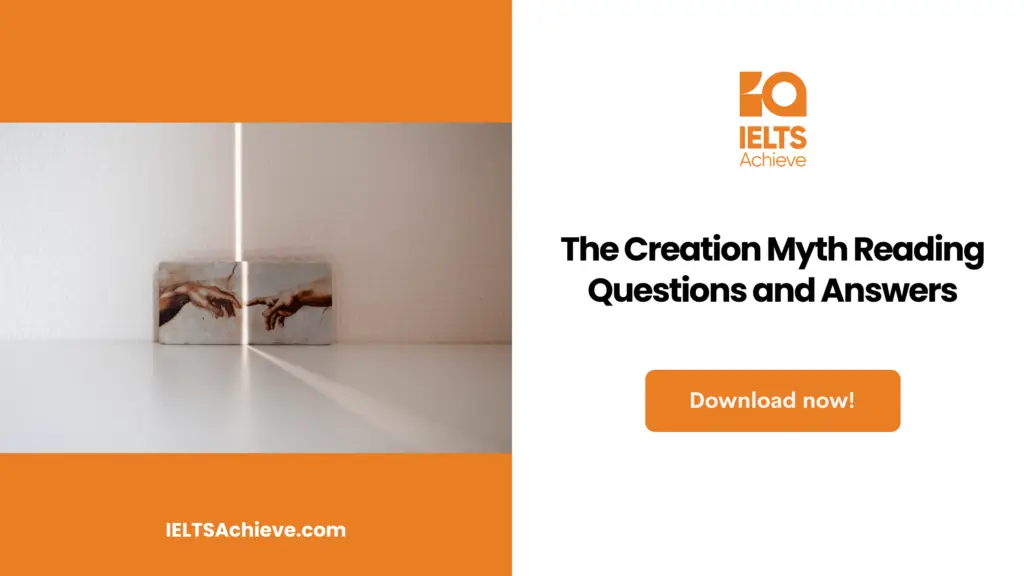The Blog post contains the following IELTS Reading Questions:
- IELTS Reading Locating Information
- IELTS Reading Multiple Choice Questions
- IELTS Reading Yes No Not Given
Stay informed and prepared for success – Explore our comprehensive Reading Test Info page to get valuable insights, exam format details, and expert tips for mastering the IELTS Reading section.
IELTS Reading Passage – The Creation Myth

The Creation Myth
That creative people’s abilities are God- or nature-given is a widespread myth. Many of us carry the seeds of genius resting within us, but we have yet to discover its full potential. However, how far do we have to go to discover the road to originality? Far beyond the imagination of so many of the things we do on a daily basis—opening the door, shaving, getting dressed, walking to work—we do it out of habit because we have to. If this weren’t the case, we would likely go crazy without it. Though it varies from person to person, the strength of our habits is such that they can overwhelm our conscious efforts at creativity. For instance, we might set out on foot to take a different route to the office, only to find ourselves back on our regular route. It would be too late to reconsider our decision at that point. Perhaps some other time. The same is true in every aspect of our existence. For instance, when we set out to solve an issue, we could take different approaches, but we usually end up retracing the same steps.
So, many people’s acts and behaviours are fixed in immovable blocks, their thoughts clogged with the cholesterol of habitual actions, stopping them from operating freely and, as a result, limiting creativity. The obsessive need to impose order on the world is just one example of how mankind’s battle for survival has backfired and become a form of tyranny. You can see it in the way people treat time, social norms, and the multitude of laws and restrictions that have been imposed on the human mind.
School is where people learn how to keep their creative abilities in check. School, then college, and then work all teach us how to control our lives by putting more and more limits on us, which is getting worse as technology gets better. So, should we be surprised that creativity seems to be so rare? It is stuck in the prison we built for it. Yet, even in this hostile environment, the groundwork for creativity is being laid. This is because getting started on the creative path means using rules and regulations. These restrictions are needed so that they can be broken once they are learned.
True creativity is typically depicted as the product of a mind that is uncontrolled and unbound. But, a more accurate representation would be of a mind that is free to roam when it so chooses and that understands laws and regulations as merely parameters that may be established and torn down at leisure. Maybe it would help to see how the human mind may be conditioned to be creative. The brains of others have an arch, and like stiff muscles, this arch must be released in order to realise its full potential. As a sort of stimulation, the participants in the activity can be restricted from using specific solutions or lines of reasoning in order to complete the task. This forces them into uncharted areas, where they may make surprising discoveries. Convincing others that creativity is possible is challenging because of the widespread belief that it is impossible, due to the widespread myth and mythology surrounding the creative process. Subconscious fear is also at play here; after all, breaking out from one’s established mental routines is comparable to crazy. When you crack open Pandora’s box, though, a new world appears.
Removing obstacles is a significant factor in facilitating thought regulation, as opposed to the mind’s default of allowing ideas to bump into each other at random. Parameters help the mind focus by providing a structure for ideas. Thoughts from various parts of the brain can combine to generate a new concept through the process of “lateral thinking,” which is equivalent to the formation of a molecule from a collection of individual atoms. In other words, once the concept has been conceived, it must be contained lest it evaporate into thin air. The mind has to concentrate on it for a while before it can recall or use it again. The constraints can then serve as avenues for the growth and maturation of the ideas. After an idea has been developed to its logical conclusion in one’s mind, it is time to loosen the reins and let it freely mingle with other concepts.
Unlock your full potential in the IELTS Reading section – Visit our IELTS Reading Practice Question Answer page now!
Recommended Questions:
Renewable Energy IELTS Reading Question with Answer
The Creation Myth IELTS Reading Questions
Questions 1-5
The Reading Passage below has 5 paragraphs. Which paragraph focuses on the Information below?
Write the correct letters (A-E) in Boxes 1-5 on your answer sheet.
NB. For each answer, write only ONE letter.
- How mental constraints inspire uniqueness.
- The importance of studying the rules so that one can break them.
- What limits our ability to think outside the box: our habits.
- Methods for cultivating imaginative thought.
- How the need for structure can become a mental prison.
Questions 6-10
Select the appropriate letters A-D
On your answer sheet, write them in Boxes 6-10.
6. The writer believes creative people
- Born with their talents.
- Naturally talented
- Not gifted.
- Geniuses
7. The author says that creativity is…
- a present from God or the world
- a natural reaction
- hard for a lot of people to get
- a well-trodden path
8. The author says that…
- the fight to live is becoming a tyranny
- cholesterol is clogging up the human brain
- the human race is now limited by its talents
- The need for humans to stay alive kills creativity
9. The advancement of technology…
- stops creativity
- makes creativity better
- makes creative thinking better
- is a dictatorship
10. The author says that creativity
- is a common trait
- is becoming more common
- is getting harder to find.
- is difficult to come across.
Ready to improve your performance in Multiple Choice Questions (MCQs)? Click here to access our comprehensive guide on how to tackle MCQs effectively in the IELTS Reading section.
Questions 11-14
Do the following statements match what you learned in the reading passage?
In the 11-15 boxes, write:
YES if the statement agrees with the information
NO if the statement contradicts the information
NOT GIVEN if there is no information on this
11. Parameters are factors like rules and regulations.
12. The need for free speech and a totally free society is linked to having a truly creative mind.
13. People think it’s impossible to be creative, which is a problem.
14. The act of making something is related to going crazy.
Want to excel in identifying the writer’s views and claims? Click here to explore our in-depth guide on how to accurately determine Yes, No, or Not Given in the IELTS Reading section.
Unlock your full potential in the IELTS Reading section – Visit our IELTS Reading Practice Question Answer page now!
Recommended Questions:
Renewable Energy IELTS Reading Question with Answer
The Creation Myth reading answers
1. E
2. C
3. A
4. D
5. B
6. C
7. C
8. D
9. A
10. D
11. Yes
12. Not Given
13. Yes
14. Yes

We hope you found this post useful in helping you to study for the IELTS Test. If you have any questions please let us know in the comments below or on the Facebook page.
The best way to keep up to date with posts like this is to like us on Facebook, then follow us on Instagram and Pinterest. If you need help preparing for the IELTS Test, join the IELTS Achieve Academy and see how we can assist you to achieve your desired band score. We offer an essay correction service, mock exams and online courses.

